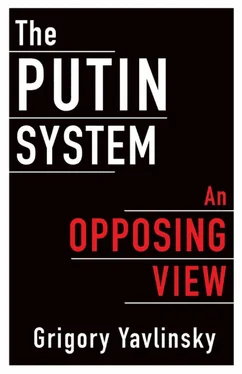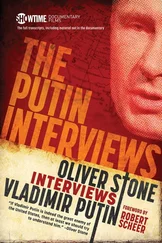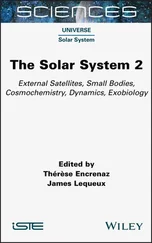Back then, no one was disputing this analysis in earnest. The debate was merely about the degrees to which all these disparate elements were present and about the immediate prospects for the system’s further evolution. At the time, the so-called liberal reformers were, on the whole, optimistic and confident that this eclectic assemblage of different kinds of economic activities was merely a reflection of the economy’s transitional character in the 1990s and that the spontaneous course of events was bringing Russia’s economy closer to the mainstream of Western capitalism. For me, to the contrary, there was nothing in the state of Russia’s economy at the time that would spontaneously propel it, as if on autopilot, toward a mature competitive capitalist economy.
I also noted that these disparate types of relationships in Russia’s economy were not separated from each other by clear-cut boundaries. In other words, its economy was not neatly divided into segments dominated by specific types of organization, such as traditional, modern, postsocialist, and shadow economies. Instead, these ways of economic life were closely intertwined with each other, with the same economic sectors, the same companies, and even the same individuals pulled into these different economic orbits at the same time. As a result, each economic actor had to deal with a mixture of disparate norms, consisting of legal requirements, informal understandings, administrative dictates, violent crime (including violence that originated with government agencies), and a vast field of uncertainty, dominated by individual luck. In some of my writings, I characterized this state of affairs as an “economy of might and of happenstance.” [1] G. A. Yavlinsky, Rossiiskaia ekonomicheskaia sistema: Nastoiashchee i budushchee [The Russian Economic System: Today and Tomorrow] (Moscow: Medium, 2007). See also Grigory Yavlinsky, “Russia’s Phony Capitalism,” Foreign Affairs , May/June 1998; Sergei Braguinsky and Grigory Yavlinsky, Incentives and Institutions: The Transition to a Market Economy in Russia (Princeton, N.J.: Princeton University Press, 2000); and Grigory Yavlinsky, Realeconomik: The Hidden Cause of the Great Recession (and How to Avert the Next One) (New Haven, Conn.: Yale University Press, 2011).
In this kind of an economy, actors have to rely upon rules of the game that emerge outside of anyone’s control, are rather volatile, and may change substantially, even within a single investment cycle, under the influence of changes in power relationships and of merely accidental factors.
Yet another thing that I considered to be very important was the assessment of the deeper roots of the Russian authorities’ failure to get its economic house in order. Although it was true that Moscow ministerial cabinets in the 1990s made specific mistakes in their economic policies and failed to combat economic crime to the extent that was necessary, these were not the root causes of the failures of “transition.” Rather, the primary cause was the poor understanding of the overall character of the social formation that emerged in the place of the Soviet economic system.
At the time of Russia’s transition, I widely used the term “peripheral capitalism” to describe the country’s economic system. I believe this reflects not only Russia’s position in the global economy, of which the Russian economy became an inseparable part after the collapse of the Soviet-era “developed socialism,” but also the characteristics of the new social system that emerged from its ruins. My point was that many aspects of these types of economic relationships, however regrettable, were a norm not just for Russia but also for the peripheral parts of world capitalism in general, regardless of the many country-specific distinctions that might be of great significance. The features of the socioeconomic framework that characterized Russia in the late 1990s can also be found in many “transitional” polities outside of the core of the contemporary world economy.
Accordingly, my forecast differed from that of forecasters who were essentially optimistic about the allegedly approaching completion of the transitional period and who envisioned a young and energetic Russian capitalism about to take the country’s future into its mighty hands. For my part, I claimed that a transition from the state of affairs that had emerged in Russia’s economy by that time to an economy like that which characterized developed countries was not going to be smooth or “natural.” Rather, it was a rare historic opportunity that required persistent, intentional efforts by Russia’s entire political class. I reasoned that, in order to achieve this, Russia needed a new social contract and the establishment of fundamentally new institutions that would be used to implement genuine rather than fictitious reforms. Many of my critics dismissed this as tedious lecturing, as a justification for my alleged reluctance to assume responsibility for taking part in the transformation of Russia, which they viewed as perhaps complicated but, overall, “moving in the right direction.”
In quite a few of my writings, I pointed out that the system of peripheral capitalism that was rapidly taking shape in Russia had an internal resource for survival and could sustain itself for decades without major changes, especially in the absence of external threats challenging its durability. [2] See, for example, Grigory Yavlinsky, Periferiinyi kapitalizm [Peripheral Capitalism] (Moscow: EPIcenter, 2003); or Perspektivy Rossii: Ekonomicheskii i politicheskii vzgliad [Russia’s Prospects: An Economic and Political View] (Moscow: Galleia-print, 2006).
This system relied upon its own social base among those strata and groups in society that were able to extract bureaucratic and criminal rents from their current position, in spite of the volatility of the rules of the game—and that could sometimes bend those rules in their favor. Moreover, vast reserves of raw materials, first of all hydrocarbons, enabled the Kremlin not only to guarantee the long-term well-being of the privileged class (that is, those who could take advantage of their position in society to extract rents) but also to provide jobs and incomes to the fairly large strata of those who were able to capture, in one way or another, the flows of income and demand resulting from the extraction and the utilization of these natural resources. This kind of a system has a high probability of stabilizing itself for an extended period. Such a system, no matter how ugly and inefficient, has no rigid internal constraints that would impede its stabilization. Moreover, in the medium term it can coexist with economic growth, a rise in incomes and consumption, and a prevailing sense of increasing prosperity.
Accordingly, I believed that only politically driven, intentional actions, with the support of the majority of economic elites, would be able to pull Russia out of this ill-fated equilibrium of a stagnation-prone system. I saw as questionable the idea of a spontaneous evolution of the country’s mind-set and institutions, which was touted by many back then. That was why I repeatedly called for a broad-based nongovernmental coalition of forces in support of reforms and, as a matter of fact, for imposing a new economic policy agenda upon the authorities. This agenda included the legitimation of state authority and property ownership in Russia through their broad-based recognition by the public, based on the principles of the rule of law, justice, and social responsibility as well as the inseparability of the rights and obligations of property owners. It required preventing the concentration of power in anyone’s hands and the establishment of mechanisms for a legally impeccable replacement of those in power, through pressure from below. Finally, my agenda called for greater transparency in decision-making by government agencies, political parties, lobbying groups, and so on. As a means toward these goals, I proposed to develop a broad-based agreement to be signed by representatives of the government, big business, and civil society. Such an agreement would lay out a road map of practical actions toward these goals. [3] See, for example, my article in Voprosy ekonomiki [Economic Affairs] 9 (2007): 19–26.
Читать дальше












